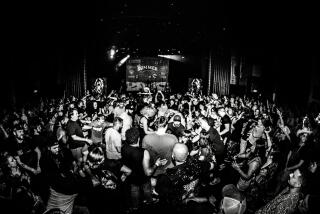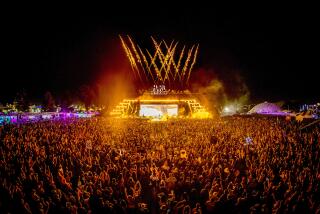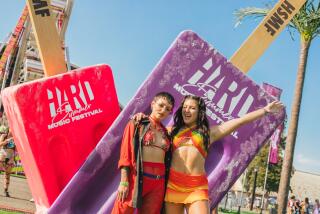Chamber Festival Shows It Can Finally Hang Ten at the Beach
LA JOLLA--No one is ever likely to confuse La Jolla with one of the old-world European resorts that host summer classical music festivals.
Beethoven and Brahms in the environment of a Southern California beach town--even this upscale one--on a Saturday night continue to strike a chamber musicgoer as a slight disconnect.
But this year at SummerFest 2002, the three-week chamber music festival that opened this weekend, something significant has changed. The disconnect is no longer quite so disconcerting. Saturday night, after hearing the energetic, American-accented Orion String Quartet, a stroll through La Jolla night life seemed just fine. Two weeks hence, when Michael Daugherty’s “Dead Elvis” and “Sinatra Shag” are on the bill, worlds may well merge.
It may seem odd that it has taken a violinist from Taiwan to finally give SummerFest its American, and to some extent West Coast, cast. But in his second season as artistic director, Cho-Liang Lin is beginning to manage that, both with American music and a feisty American approach to music making.
This year’s impressive composers in residence are John Harbison, John Adams and Esa-Pekka Salonen. Among the performers are the flashy violinist Leila Josefowicz, maverick Bach and ragtime expert Anthony Newman, and such all-American individualists as pianists Leon Fleisher, Christopher O’Riley and Jeffrey Kahane.
Saturday’s Orion concert in the Sherwood Auditorium of the Museum of Contemporary Art San Diego was more or less traditional, opening with Beethoven’s String Quartet, Opus 18, No. 4 and concluding with Brahms Sextet, Opus 36. But in the center was the first performance of John Harbison’s String Quartet No. 4--the first major new piece from Harbison, who was composer in residence of the Los Angeles Philharmonic in the ‘80s, to receive a premiere in Southern California in more than a decade.
Since writing his first in 1984, Harbison has been an occasional string-quartet composer. His first two quartets are fond and wonderful exercises in translating techniques from Renaissance and Baroque music into glowing modern sonorities. The Third, from 1993, is an intense and dramatic, 22-minute single movement, but it too has an aura of times past, its inspiration coming from American hymn tunes and plainchant. Another small piece for string quartet, “Thanks Victor,” is a lustrous arrangement of Victor Young tunes.
In a preconcert talk, Harbison explained that he wrote his Fourth Quartet quickly, during a three-week period last summer at an artists colony in Italy.
That knowledge may color a listener’s first impression of the work, but it was hard not to sense a dappled Umbrian light in its shining harmonies, not to taste the earthy truffles in the refulgent string textures, not to feel the impassioned character of Italian life in the operatic dialogues between the first violin and cello. Having spent much of the ‘90s with his opera, “The Great Gatsby,” Harbison said the operatic qualities of Mozart’s string quartets were on his mind while composing.
The new quartet begins with a long, rhapsodic melody in the cello, robustly played by Timothy Eddy; it grows ever more ardent throughout the first movement. The operatic duet between Eddy and violinist Daniel Philips in the two middle movements suggests a love scene, first restrained, then warmer and more personal, with even a hint of something torrid. The last movement is happy, content.
The other Orion players, violinist Todd Phillips and violist Steven Tenenbom, are supporting characters, but the quality of Harbison’s writing for them, as they circle, color and engulf the principles, give the quartet its atmosphere of captivating radiance.
Elsewhere on the program, the Orion’s distinguishing trait was its thick, robust sound and rhythmic zeal. Beethoven’s early quartet (a last-minute replacement for Opus 127) was forthright and forceful. Brahms’ sextet, which included violist Michael Tree and cellist Ralph Kirshbaum, was more deliberate. The leisurely pace and plush textures created a kind of resort Brahms, everything so well prepared that it felt as if these musicians were there to serve and anticipate every need of a listener lounging in the lap of luxuriously full string sounds. It is a better piece when an audience is not coddled, when there can be surprise. But it sure was ravishing.
SummerFest continues through Aug. 18, Sherwood Auditorium, Museum of Contemporary Art, La Jolla and other locations. (858) 459-3728.
More to Read
The biggest entertainment stories
Get our big stories about Hollywood, film, television, music, arts, culture and more right in your inbox as soon as they publish.
You may occasionally receive promotional content from the Los Angeles Times.











